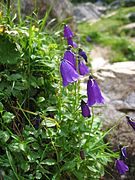Campanula pulla
Appearance
| Campanula pulla | |
|---|---|

| |
| Close-up of flower | |

| |
| Botanical illustration | |
| Scientific classification | |
| Kingdom: | Plantae |
| Clade: | Tracheophytes |
| Clade: | Angiosperms |
| Clade: | Eudicots |
| Clade: | Asterids |
| Order: | Asterales |
| Family: | Campanulaceae |
| Genus: | Campanula |
| Species: | C. pulla
|
| Binomial name | |
| Campanula pulla | |
| Synonyms[1] | |
| |
Campanula pulla, the solitary harebell, is a species of flowering plant in the family Campanulaceae, native to the northeastern Alps of Austria.[1] [2] A spreading, mat-forming perennial, the Royal Horticultural Society recommends it for scree gardens.[3] It is available from commercial suppliers.[4] There appear to be cultivars or selections; 'Blue Drops' and 'Alba',[5][6] and a hybrid with Campanula carpatica; Campanula × pulloides, which itself has cultivars, 'Jelly Bells', and 'G.F. Wilson', which has gained the RHS Award of Garden Merit.[7][8][9]
-
Habit
-
Illustration by Margaret Roscoe
-
Here labeled as dark bellflower
References
[edit]- ^ a b "Campanula pulla L." Plants of the World Online. Royal Botanic Gardens, Kew. Retrieved 17 December 2022.
- ^ "Campanula pulla (CMPPL)". EPPO Global Database. European and Mediterranean Plant Protection Organization. 2022. Retrieved 17 December 2022.
- ^ "Scree gardening". The Royal Horticultural Society. 2022. Retrieved 17 December 2022.
- ^ "Campanula pulla". The Royal Horticultural Society. 2022. Retrieved 17 December 2022.
4 suppliers ... Synonyms; Campanula pulla 'Blue'
- ^ "Campanula pulla 'Blue Drops'". The Royal Horticultural Society. 2022. Retrieved 17 December 2022.
- ^ "Campanula pulla 'Alba'". The Royal Horticultural Society. 2022. Retrieved 17 December 2022.
1 suppliers
- ^ "Campanula × pulloides Farrer". Plants of the World Online. Royal Botanic Gardens, Kew. Retrieved 17 December 2022.
This name is unplaced
- ^ "Campanula × pulloides 'Jelly Bells'PBR". The Royal Horticultural Society. 2022. Retrieved 17 December 2022.
- ^ "Campanula × pulloides hort. 'G.F. Wilson' bellflower 'G.F. Wilson'". The Royal Horticultural Society. 2022. Retrieved 17 December 2022.
7 suppliers



